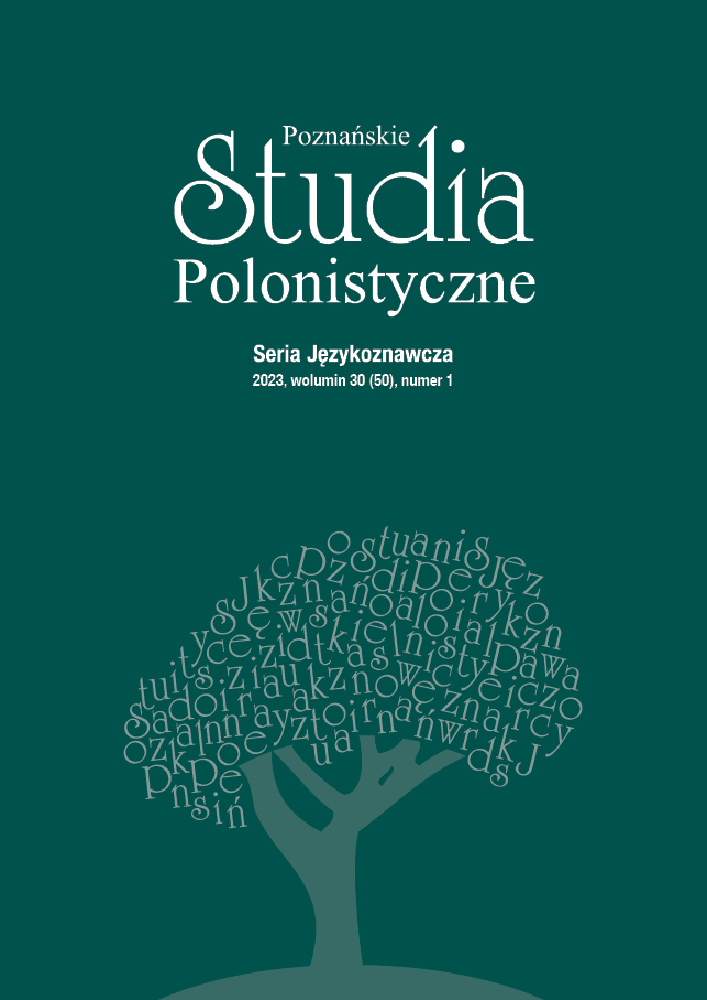Abstract
The general aim of this outline is to indicate the diverse merits of women’s personal document literature for the study of women’s independence discourse. The specific objective is to identify the various points of view (understood as a linguistic category) that emerge in the texts regarding war and to reconstruct the image of war that emerges from the narratives of the female authors. Consequently, it can be said that the value of women’s personal document literature for researching women’s independence discourse is determined not only by its different perspective (presumably distinct from the male or official perspective) but also by the internal diversity within this discourse, which is connected to the broadly understood ideology.
References
DL1, DL2 – Romanowiczówna Zofia, Dziennik lwowski 1842–1930, vol. 1–2, Warszawa 2005.
SO – Służba Ojczyźnie. Wspomnienia uczestniczek walk o niepodległość (1929), Warszawa, https://tinyurl.com/yck5ktd6 [access: 4 July 2023].
DP – Jabłońska von Seifert Helena (2017), Dziennik z oblężonego Przemyśla (1914–1915), Przemyśl 2017, https://tinyurl.com/csdneaa4 [access: 4 July 2023].
DN2, DN3 – Nałkowska Zofia (1976), Dzienniki, vol. 2–3, Warszawa.
Bartmiński Jerzy (1999), Punkt widzenia, perspektywa, językowy obraz świata, in: Językowy obraz świata, ed. idem, Lublin, pp. 103–120.
Bobako Monika (2009), Powrót kobiet do historii – niedokończony projekt?, Biblioteka Online Think Tanku Feministycznego, https://tinyurl.com/59tyv778 [access: 18 November 2022].
Bujak Jan (access 2022), Zofia Romanowiczówna, https://tinyurl.com/54zy9jrf [access: 18 November 2022].
Dąbrowska Danuta (2004), Udomowiony świat. O kobiecym doświadczaniu historii, Szczecin.
Hawrysz Magdalena (2018), Językowe mechanizmy apoteozy walki o niepodległość we wspomnieniach uczestniczek I wojny światowej (w kontekście pamięci zbiorowej), “Roczniki Humanistyczne” 2018, no. 6, pp. 43–55. DOI: https://doi.org/10.18290/rh.2018.66.6-3
Kłosińska Krystyna (2003), Écriture féminine. Rok 1974, “Język Artystyczny”, vol. 12: Literatura kobiet, literatura kobieca, kobiecość w literaturze, pp. 213–247.
Pekaniec Anna (2015), Kobieta – miasto – wojna. Dwie narracje autobiograficzne z przemyskiej twierdzy (1914–1915), “Ruch Literacki” 2015, no. 5, pp. 511–523.
Walczak Bogdan (2002), Jeszcze raz w sprawie wartości pamiętników jako źródeł do dziejów języka polskiego, in: Język polski. Współczesność. Historia, vol. 2, ed. Władysława Książek-Bryłowa, Henryk Duda, Lublin, pp. 193–201.
Wójcik Włodzimierz (1999), Pierwsza wojna światowa w oczach Zofii Nałkowskiej, in: Pierwsza wojna światowa w literaturze polskiej i obcej. Wybrane zagadnienia, ed. Eugenia Łoch, Krzysztof Stępniak, Lublin, pp. 189–195.
Witosz Bożena (2016), Kategoria dyskursu w polonistycznej edukacji akademickiej, in: Jak analizować dyskurs? Perspektywy dydaktyczne, ed. Waldemar Czachur, Agnieszka Kulczyńska, Łukasz Kumięga, Kraków, pp. 19–39.
Zimand Roman (1990), Diarysta Stefan Ż., Wrocław.
License
Copyright (c) 2023 Magdalena Hawrysz

This work is licensed under a Creative Commons Attribution-NoDerivatives 4.0 International License.
Authors
The Author declares that they are entitled to personal and property (material) copyrights to their work published in “Poznańskie Studia Polonistyczne. Seria Językoznawcza”, and that these rights are not limited by the terms of Author’s agreement. The Author warrants the originality, authorship, and sole ownership of all rights to the Work, and affirms that they have the right to grant all kinds of licenses hereinabove without infringing on the intellectual property rights of any third party, including personal rights.
The Author(s) retains copyright to their article and the right to freely dispose of the work, granting Adam Mickiewicz University in Poznań a non-exclusive, royalty-free licence under the Attribution-NoDerivatives 4.0 International (CC BY-ND 4.0) Creative Commons licence to use the Work without territorial restrictions for an indefinite period in the fields of use designated in the Author’s agreement.
Users
Interested Internet users are entitled to use works published in „Poznańskie Studia Polonistyczne. Seria Językoznawcza” since 2016 under the following conditions:
- attribution - obligation to provide, together with the distributed work, information about the authorship, title, source (link to the original work, DOI) and the license itself.
- no derivatives - the work must be preserved in its original form, without the author's consent it is not possible to distribute the modified work, such as translations, publications, etc.
Copyrights are reserved for all texts published before 2016.
Other
Adam Mickiewicz University in Poznań retains the right to the journal as a whole (including its layout, graphic design, title, cover design, logo and more).

